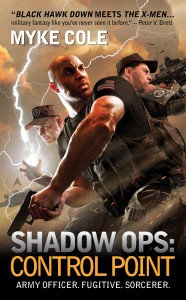About a million years ago, I attended the Viable Paradise writers workshop in Martha’s Vineyard, MA. It was the 6th running of the class (I think they’re up to 16 now), and I was really fortunate to be instructed by the likes of Steven Gould and James Patrick Kelly.
Since then, dinosaurs became extinct, mammals came first to dominate the earth, and then to develop sentience and finally franchise cafes where you can pay $7 for a cup of coffee, and one thing from that class has really stuck with me. It was a lecture from James MacDonald, where he described his father’s commitment to detail in building model ships. He told the story of his father building a scale model ship (some WWII frigate, I think), where every part was exactly 1/16th of a inch of the actual size.
When his father got around to building the ship’s galley, he was sure to put in a stove, with burners and knobs, and a refrigeration unit. He also put in a 1/16th inch scale meat locker, for cold storage.
And inside that meat locker? 1/16 inch scale hams.
Now, once the ship’s model was complete, there was no way you were going to be able to see inside the ship’s hull. Even if you could, you wouldn’t be able to see inside the galley. Even if there was some kind of cutaway in the hull to see the galley, you probably wouldn’t have been able to make out the meat locker and you *sure* as hell weren’t going to be able to see the hams. The casual viewer of the model would never know they were in there.
But MacDonald’s father knew they were in there, and that, he argued, was what was important.
This is, of course, an analogy to writing. The “Hams in the Meatlocker,” are the details and worldbuilding that writers must do to fully understand their characters, the mechanics of their magic-system, the politics and cultural niceties of the societies they portray. There is a ton of work a writer must do to fully conceptualize a story. And it’s critical that this work be done; without understanding the depths of a characters flaws, goals, hopes, interests and idiosyncrasies (and I mean down to the most minute detail: what kind of music do they like? Who’s their favorite baseball team?), a writer can’t make their characters real and compelling. Without understanding every detail of how magic is called, bound, channeled and cast, you cannot have a magic-system that stands up to the kind of scrutiny smart readers (and genre readers tend to be awfully smart) are going to subject it to.
So, like MacDonald’s father, you *must* make the hams. And, like MacDonald’s father, you must *hide* them.Â
Because even though it took a TON of work to come up with all that stuff, your reader doesn’t care. They didn’t come to see your hard work, the scaffolding you built to prop up the facade. They came to be entertained, to sit back and enjoy a good story. The Turkey City Lexicon (and if you haven’t read it and aspire to write SF/, you should. It’s here, and lists the following as a classic background problem in stories:
“I’ve suffered for my Art†(and now it’s your turn)
This is a form of info-dump in which the author inflicts upon the reader hard-won, but irrelevant bits of data acquired while researching the story. As Algis Budrys once pointed out, homework exists to make the difficult look easy.  Â
The point is this: Yes, it’s hard work. Yes, you have to do it. And no, you shouldn’t show it to anyone else.Â
Hams in the Meatlocker. Put it in your deleted scenes file for your diehard fans when you hit it big. Talk about it in interviews, or over a beer at a con.
But *don’t* put it in your prose. Like MacDonald’s father, being able to nod in satisfaction at tremendous effort that only you know about is an important skill. It is the first step on the road to being able to appreciate the work for the work’s sake, which is perhaps one of the most pivotal writing skills of all.Â

Hams in the meatlocker. I like that analogy.
I once ran a Roleplaying campaign where I had names and personalities defined for a number of members of the royal family that the player characters, who worked for the crown, were unlikely at best to ever meet.
Why?
Because I needed them to be there, for a sake of completeness. I knew the names of the king’s cousin and her family, and that was important to me.
My own hams, so to speak.
This is great advice. I think that when a story feels “thin” or otherwise unsatisfying, it’s in large part because maybe the author hasn’t done this painstaking work ahead of time.
And while I absolutely agree that all of that stuff should never show up in the work itself, I admit, as a writer, that I’d love to see all the stuff that doesn’t make it into the final work, just to see how the minds of some of my favorite authors work.
Hams in the meatlocker, check.
Meh. I’m not going to argue with success, but I think it’s possible to be successful without all that, too.
IMO, what’s important is that the reader think you did the work, not whether you did it. George Martin didn’t develop a word of Dothraki that he didn’t use. No one complains.
You certainly CAN do the work if it helps you – backstory and side-story is great for story ideas, and it can certainly help. But fiction is illusion, not reality, and for me, spending months and years a la Papa Tolkien is only one possible path to telling good stories.